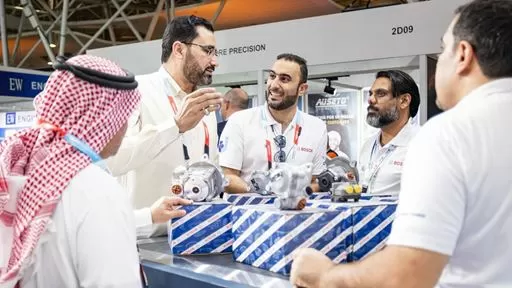Digitalisation, electric vehicle adoption, and artificial intelligence are transforming the automotive industry in Saudi Arabia, and with it, the workforce needs. These changes are driven by the country’s ambitious goals of reducing its dependence on oil and moving towards a more sustainable future. As the automotive landscape evolves, so must the skills and capabilities of the workforce. This is where the Automechanika Academy comes in, providing essential training and education for the next generation of automotive professionals.
Saudi Arabia has long been known as a leader in the oil industry, but with the global shift towards renewable energy, the country is now looking to diversify its economy. One of the key areas of focus is the transportation sector, which accounts for a significant portion of the country’s carbon emissions. As a result, the Saudi government has set a goal of having 30% of all vehicles in the country be electric by 2030. This ambitious target will not only reduce the country’s carbon footprint but also create new opportunities for the automotive industry.
The adoption of electric vehicles (EVs) in Saudi Arabia is gaining momentum. In 2019, the country saw a 59% increase in the sales of EVs, and this trend is expected to continue as the government offers incentives and promotes the development of charging infrastructure. With the rise of EVs, the demand for traditional petrol and diesel vehicles is expected to decline, leading to a shift in the type of work available in the automotive sector.
As the automotive industry evolves, so does the need for a skilled and adaptable workforce. This is where the Automechanika Academy plays a crucial role. Established in partnership with the Saudi Skills Standards (SSS), the academy offers a range of training programs to prepare Saudi youth for the changing automotive landscape. The academy’s courses cover a wide range of topics, including electric vehicle technology, digitalisation, and artificial intelligence, to equip students with the skills needed to excel in the industry.
One of the key areas of focus for the Automechanika Academy is digitalisation. As technology continues to advance, it is transforming the automotive industry, and professionals need to keep up with these changes. From virtual car design to digital diagnostics, the academy’s courses provide students with hands-on training in the latest digital tools and technologies. This not only prepares them for the current workforce needs but also future-proofs their skills for the ever-evolving industry.
Another area of focus for the Automechanika Academy is electric vehicle technology. With the rising demand for EVs, there is a need for a skilled workforce to handle the maintenance and repair of these vehicles. The academy provides students with in-depth knowledge of electric vehicle systems, including batteries, motors, and charging infrastructure. This training is vital as it prepares students for the future of the automotive industry, where EVs are expected to become the norm.
In addition to digitalisation and electric vehicle technology, the academy also offers courses on artificial intelligence (AI). As AI becomes increasingly integrated into vehicles, it will play an essential role in improving safety, efficiency, and overall performance. The academy’s AI courses provide students with a fundamental understanding of how this technology works and its applications in the automotive industry. This knowledge will be crucial for professionals looking to stay ahead in the rapidly evolving landscape.
The Automechanika Academy is not only providing essential training for the current workforce needs but is also playing a crucial role in developing a new generation of automotive professionals. With its modern facilities and experienced instructors, the academy is creating a learning environment that fosters innovation and creativity. It is also promoting a culture of continuous learning, which is crucial in an industry that is constantly evolving.
The academy’s efforts are in line with the Saudi government’s Vision 2030, which aims to create a knowledge-based economy and develop a highly skilled local workforce. By providing training and education in emerging technologies, the Automechanika Academy is contributing to the country’s economic diversification and supporting the growth of the automotive industry.
In conclusion, the automotive industry in Saudi Arabia is undergoing a significant transformation, driven by digitalisation, electric vehicle adoption, and artificial intelligence. These changes are reshaping the workforce needs, and the Automechanika Academy is playing a vital role in preparing professionals for the future. With its comprehensive training programs, the academy is not only meeting the current demands of the industry but also equipping students with the skills needed to excel in the ever-evolving automotive landscape. This is a positive step towards a

